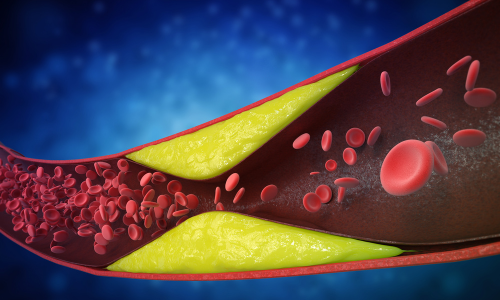Types of Cholesterol
Cholesterol travels through the blood attached to proteins. This combination of proteins and cholesterol is called a lipoprotein. There are two main types of lipoproteins:
- Low-Density Lipoprotein (LDL): Often referred to as “bad” cholesterol, LDL carries cholesterol from the liver to the cells. High levels of LDL cholesterol can lead to plaque buildup in the arteries, increasing the risk of cardiovascular diseases.
- High-Density Lipoprotein (HDL): Known as “good” cholesterol, HDL carries cholesterol away from the cells and back to the liver, where it is processed and removed from the body. Higher levels of HDL cholesterol are associated with a lower risk of heart disease.
Causes of Hypercholesterolemia
Several factors can contribute to high cholesterol levels, including:
- Genetics: Familial hypercholesterolemia is an inherited condition that causes high cholesterol levels from a young age.
- Diet: Consuming foods high in saturated fats, trans fats, and cholesterol can raise blood cholesterol levels.
- Lack of Physical Activity: A sedentary lifestyle can lead to weight gain and higher cholesterol levels.
- Obesity: Excess body weight is linked to higher levels of LDL cholesterol and lower levels of HDL cholesterol.
- Smoking: Smoking can lower HDL cholesterol and damage the lining of the arteries.
- Age and Gender: Cholesterol levels tend to increase with age. Men generally have higher cholesterol levels than women before menopause.
- Medical Conditions: Diabetes, hypothyroidism, and certain liver or kidney diseases can contribute to high cholesterol levels.
Symptoms of Hypercholesterolemia
Hypercholesterolemia itself typically does not cause any symptoms. It is often discovered during routine blood tests. However, if left untreated, high cholesterol can lead to the development of atherosclerosis (narrowing and hardening of the arteries), which can cause symptoms such as:
- Chest pain (angina)
- Heart attack
- Stroke
- Peripheral artery disease (pain and numbness in the legs)
Diagnosis of Hypercholesterolemia
To diagnose hypercholesterolemia, your doctor will perform a blood test called a lipid panel or lipid profile. This test measures the levels of total cholesterol, LDL cholesterol, HDL cholesterol, and triglycerides (another type of fat in the blood).
A typical lipid panel includes:
- Total Cholesterol: The sum of your blood’s cholesterol content.
- LDL Cholesterol: Ideally, should be less than 100 mg/dL.
- HDL Cholesterol: Higher levels are better, ideally above 60 mg/dL.
- Triglycerides: Levels should be less than 150 mg/dL.
Treatment Options for Hypercholesterolemia
Managing high cholesterol typically involves a combination of lifestyle changes and, if necessary, medications.
- Lifestyle Changes:
- Healthy Diet: Emphasize fruits, vegetables, whole grains, and lean proteins. Limit foods high in saturated fats, trans fats, and cholesterol.
- Exercise Regularly: Aim for at least 150 minutes of moderate-intensity exercise per week. Physical activity can help raise HDL cholesterol and lower LDL cholesterol.
- Maintain a Healthy Weight: Losing excess weight can help lower cholesterol levels.
- Quit Smoking: Stopping smoking can improve HDL cholesterol levels and overall heart health.
- Limit Alcohol Intake: Drinking alcohol in moderation, if at all.
- Medications:
- Statins: These are the most commonly prescribed medications for lowering LDL cholesterol. They work by reducing the amount of cholesterol produced by the liver.
- Bile Acid Sequestrants: These medications help remove cholesterol from the bloodstream by binding to bile acids.
- Cholesterol Absorption Inhibitors: These drugs reduce the absorption of cholesterol from the diet.
- PCSK9 Inhibitors: These newer medications can significantly lower LDL cholesterol levels by helping the liver absorb more LDL cholesterol.
- Fibrates: These drugs primarily lower triglycerides and, to a lesser extent, increase HDL cholesterol levels.
- Niacin: This vitamin B3 derivative can help lower LDL cholesterol and triglycerides while raising HDL cholesterol.
Preventing Hypercholesterolemia
Preventing high cholesterol involves making healthy lifestyle choices:
- Eat a Heart-Healthy Diet: Focus on a diet rich in fruits, vegetables, whole grains, and lean proteins. Limit saturated fats, trans fats, and cholesterol.
- Exercise Regularly: Engage in regular physical activity to maintain a healthy weight and improve cholesterol levels.
- Maintain a Healthy Weight: Achieve and maintain a healthy body weight.
- Avoid Tobacco Smoke: Smoking cessation and avoiding secondhand smoke can improve HDL cholesterol levels.
- Limit Alcohol Consumption: Drink alcohol in moderation.
Living with Hypercholesterolemia
Living with high cholesterol requires ongoing management and monitoring:
- Follow Your Treatment Plan: Take prescribed medications as directed and make recommended lifestyle changes.
- Regular Check-Ups: Have your cholesterol levels checked regularly to monitor your progress.
- Stay Informed: Educate yourself about high cholesterol and its effects on your health.
- Support System: Engage with support groups or health professionals to stay motivated.
When to Seek Medical Help
If you have been diagnosed with hypercholesterolemia or have a family history of high cholesterol, it is important to seek medical advice and regular check-ups. Additionally, if you experience symptoms such as chest pain, shortness of breath, or any signs of a heart attack or stroke, seek immediate medical attention.
By understanding hypercholesterolemia, its causes, symptoms, and treatment options, you can take proactive steps to manage your cholesterol levels and improve your overall heart health. Always consult with a healthcare professional for personalized advice and treatment.


